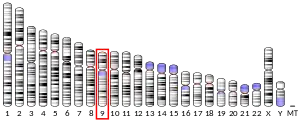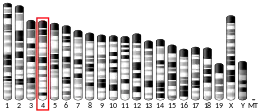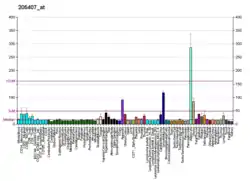RECK
Reversion-inducing-cysteine-rich protein with kazal motifs, also known as RECK, is a human gene,[5] thought to be a metastasis suppressor.
The protein encoded by this gene is a cysteine-rich, extracellular protein with protease inhibitor-like domains whose expression is suppressed strongly in many tumors and cells transformed by various kinds of oncogenes. In normal cells, this membrane-anchored glycoprotein may serve as a negative regulator for matrix metalloproteinase-9, a key enzyme involved in tumor invasion and metastasis.[5] It is one of the targets of an oncomiR, MIRN21.
References
- GRCh38: Ensembl release 89: ENSG00000122707 - Ensembl, May 2017
- GRCm38: Ensembl release 89: ENSMUSG00000028476 - Ensembl, May 2017
- "Human PubMed Reference:". National Center for Biotechnology Information, U.S. National Library of Medicine.
- "Mouse PubMed Reference:". National Center for Biotechnology Information, U.S. National Library of Medicine.
- "Entrez Gene: RECK reversion-inducing-cysteine-rich protein with kazal motifs".
Further reading
- Takahashi C, Sheng Z, Horan TP, et al. (1998). "Regulation of matrix metalloproteinase-9 and inhibition of tumor invasion by the membrane-anchored glycoprotein RECK". Proc. Natl. Acad. Sci. U.S.A. 95 (22): 13221–6. Bibcode:1998PNAS...9513221T. doi:10.1073/pnas.95.22.13221. PMC 23764. PMID 9789069.
- Gerstein M (1998). "Measurement of the effectiveness of transitive sequence comparison, through a third 'intermediate' sequence". Bioinformatics. 14 (8): 707–14. doi:10.1093/bioinformatics/14.8.707. PMID 9789096.
- Oh J, Takahashi R, Kondo S, et al. (2002). "The membrane-anchored MMP inhibitor RECK is a key regulator of extracellular matrix integrity and angiogenesis". Cell. 107 (6): 789–800. doi:10.1016/S0092-8674(01)00597-9. PMID 11747814.
- Eisenberg I, Hochner H, Sadeh M, et al. (2003). "Establishment of the genomic structure and identification of thirteen single-nucleotide polymorphisms in the human RECK gene". Cytogenet. Genome Res. 97 (1–2): 58–61. doi:10.1159/000064042. PMID 12438739. S2CID 27366060.
- Strausberg RL, Feingold EA, Grouse LH, et al. (2003). "Generation and initial analysis of more than 15,000 full-length human and mouse cDNA sequences". Proc. Natl. Acad. Sci. U.S.A. 99 (26): 16899–903. Bibcode:2002PNAS...9916899M. doi:10.1073/pnas.242603899. PMC 139241. PMID 12477932.
- Masui T, Doi R, Koshiba T, et al. (2004). "RECK expression in pancreatic cancer: its correlation with lower invasiveness and better prognosis". Clin. Cancer Res. 9 (5): 1779–84. PMID 12738734.
- Liu LT, Chang HC, Chiang LC, Hung WC (2003). "Histone deacetylase inhibitor up-regulates RECK to inhibit MMP-2 activation and cancer cell invasion". Cancer Res. 63 (12): 3069–72. PMID 12810630.
- Ota T, Suzuki Y, Nishikawa T, et al. (2004). "Complete sequencing and characterization of 21,243 full-length human cDNAs". Nat. Genet. 36 (1): 40–5. doi:10.1038/ng1285. PMID 14702039.
- Humphray SJ, Oliver K, Hunt AR, et al. (2004). "DNA sequence and analysis of human chromosome 9". Nature. 429 (6990): 369–74. Bibcode:2004Natur.429..369H. doi:10.1038/nature02465. PMC 2734081. PMID 15164053.
- Takeuchi T, Hisanaga M, Nagao M, et al. (2005). "The membrane-anchored matrix metalloproteinase (MMP) regulator RECK in combination with MMP-9 serves as an informative prognostic indicator for colorectal cancer". Clin. Cancer Res. 10 (16): 5572–9. doi:10.1158/1078-0432.CCR-03-0656. PMID 15328199.
- Simizu S, Takagi S, Tamura Y, Osada H (2005). "RECK-mediated suppression of tumor cell invasion is regulated by glycosylation in human tumor cell lines". Cancer Res. 65 (16): 7455–61. doi:10.1158/0008-5472.CAN-04-4446. PMID 16103099.
- Hsu MC, Chang HC, Hung WC (2006). "HER-2/neu represses the metastasis suppressor RECK via ERK and Sp transcription factors to promote cell invasion". J. Biol. Chem. 281 (8): 4718–25. doi:10.1074/jbc.M510937200. PMID 16377629.
- Correa TC, Brohem CA, Winnischofer SM, et al. (2006). "Downregulation of the RECK-tumor and metastasis suppressor gene in glioma invasiveness". J. Cell. Biochem. 99 (1): 156–67. doi:10.1002/jcb.20917. PMID 16791855. S2CID 24574103.
- Chang HC, Cho CY, Hung WC (2007). "Silencing of the metastasis suppressor RECK by RAS oncogene is mediated by DNA methyltransferase 3b-induced promoter methylation". Cancer Res. 66 (17): 8413–20. doi:10.1158/0008-5472.CAN-06-0685. PMID 16951151.
- Lei H, Hemminki K, Altieri A, et al. (2007). "Promoter polymorphisms in matrix metalloproteinases and their inhibitors: few associations with breast cancer susceptibility and progression". Breast Cancer Res. Treat. 103 (1): 61–9. doi:10.1007/s10549-006-9345-2. PMID 17033924. S2CID 5750512.
- Chang HC, Cho CY, Hung WC (2007). "Downregulation of RECK by promoter methylation correlates with lymph node metastasis in non-small cell lung cancer". Cancer Sci. 98 (2): 169–73. doi:10.1111/j.1349-7006.2006.00367.x. PMID 17233834. S2CID 25904319.
- Kang HG, Kim HS, Kim KJ, et al. (2007). "RECK expression in osteosarcoma: correlation with matrix metalloproteinases activation and tumor invasiveness". J. Orthop. Res. 25 (5): 696–702. doi:10.1002/jor.20323. PMID 17262820. S2CID 26447647.
- Mori T, Moriuchi R, Okazaki E, et al. (2007). "Tgat oncoprotein functions as an inhibitor of RECK by association of the unique C-terminal region". Biochem. Biophys. Res. Commun. 355 (4): 937–43. doi:10.1016/j.bbrc.2007.02.051. PMID 17328864.
- Miki T, Takegami Y, Okawa K, et al. (2007). "The reversion-inducing cysteine-rich protein with Kazal motifs (RECK) interacts with membrane type 1 matrix metalloproteinase and CD13/aminopeptidase N and modulates their endocytic pathways". J. Biol. Chem. 282 (16): 12341–52. doi:10.1074/jbc.M610948200. PMID 17329256.
- Cho CY, Wang JH, Chang HC, et al. (2007). "Epigenetic inactivation of the metastasis suppressor RECK enhances invasion of human colon cancer cells". J. Cell. Physiol. 213 (1): 65–9. doi:10.1002/jcp.21089. PMID 17443689. S2CID 23582775.
This article is issued from Wikipedia. The text is licensed under Creative Commons - Attribution - Sharealike. Additional terms may apply for the media files.




